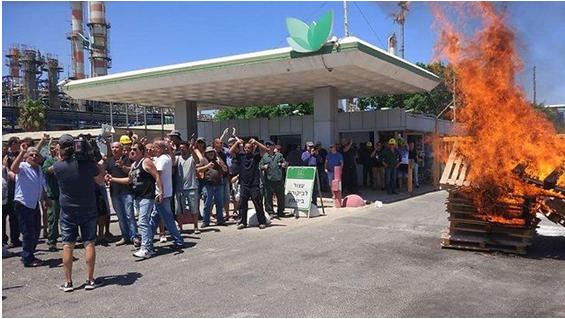Workers from the privatized Haifa Chemicals company erected protest tents and occupied factories in Haifa Bay and the Negev on Tuesday evening, August 1, both inside and outside the company plants, after it was announced earlier in the day that the these facilities were to be closed and 1,200 employees were being laid off.
In addition to blocking off the roads near the plants, the enraged workers, fearing for their livelihoods, set tires alight and waved placards against the right-wing government and the owners of Haifa Chemicals.
By Wednesday morning, dozens of Haifa Chemicals workers had assembled outside the plant’s premises, lighting fires and demanding the resignations of the company’s CEO, Nadav Shachar, and Prime Minister Benjamin Netanyahu.
Chairman of the Southern Workers’ Committee, Yehuda Peres, slammed the closures, arguing that they constituted “the targeted destruction of the periphery.”
We didn’t give up over the last five months and I don’t intend to give up now,” he stated defiantly. “Today, the struggle entered a new phase and anyone who wants to move us will have to do so by force.” Vowing to keep the protest up at full throttle until a real solution had been found, Peres went on to say that the affair would not be at the expense of the workers’ livelihoods and their children.
Haifa Chemicals is owned by US holding company Trance Resource Inc (TRI), which is controlled by Florida-based Trump Group. Haifa Chemicals has been operating for over 50 years and consumes some 68 percent of Israel’s imported ammonia to produce specialty fertilizers at plants it runs in the north and the south of the country. The plants employ some 1,200 workers directly and constitute the major source of income for another 4,500 workers, and account for 2 percent of Israel’s industrial exports, according to data provided by the company.
“With great sorrow, and after many efforts, we have reached a point in which we can no longer contain the activities of the company in Israel,” wrote Jules Trump, a 73-year-old South African-born US citizen and real estate tycoon who holds a controlling stake in the Israeli fertilizer maker. “I understand that we will not get the permit to return to our activities in the near future and so we don’t have a choice but to shut down the firm immediately.”
The controversial Haifa Chemicals ammonia tank in the Haifa Bay was ordered to be shut down in 2013, in a struggle that pitted local residents concerned over the potential for a deadly chemical leak against those who say its closure would adversely affect the economy.
Communist Knesset member Dov Khenin (Hadash – Joint List), the chair of the Social-Environmental Knesset lobby, said that the management of Haifa Chemicals was making “cynical and scandalous use of its employees.” The company has known for four years that an alternative must be found for the supply of ammonia, but it chose to “make its employees hostages in a battle that will allow them to continue to pollute and endanger public health.”
Khenin called on the government not to succumb to “this blackmail” and not to favor “the huge profits of foreign tycoons” as it “has done so far.” According to Khenin the employees must become the owners of the plants. “I appealed to the chairman of the Finance Committee yesterday to request that he convene the committee urgently to discuss the crisis and prevent the dismissal and the cynical use of the workers,” he said in a statement.
The chairman of the Histadrut Labor Union, Avi Nissenkorn, said that all factories in the south of the country with Histadrut employees would shut down for the day if no solution is found for Haifa Chemicals, and there would be further solidarity strikes around the country. “Stop with all this talking and foot-dragging,” he said in a statement. “I expect the parties, including government officials and owners of the company, to find an immediate solution.”



